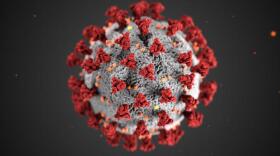Many people think of maternity wards as places of celebration, where families and friends gather to welcome newborns into the world. But over the last year, that's changed. Yarleny Roa-Dugan is a labor and delivery nurse in Las Vegas, and she shares her experience working during the pandemic in this audio diary.
In the facility where I work right now, [the] rules are very strict. They are strict to protect the workers, the babies and the other patients in the hospital. But it does affect the patients very much because this is a happy moment. Most of them, first-time moms, don’t know what to expect. They are all excited and nervous, [with] lots of feelings. But right now, they come in by themselves, and the family member has to wait for the COVID test to come back. If it's negative, they can come in, and one person can be with the patient. They cannot leave the hospital. They have to stay in the hospital the whole time the patient is in labor. If the test is positive, then the patient cannot have any visitors at all.
Right now, the patients don't have that support system with them to get them through those very nervous moments, so they look for us, and it's hard. Sometimes, if we're very busy with other patients, [we are unable] to give them as much support as the patient needs or wants. So it is putting a little bit of a strain on health care workers.
When I came home, I would come into the garage [and] change everything. I would take everything off, put it in a bag, basically be in underwear only, sometimes nothing, and just walk directly to the bathroom and take a shower before I said hello to anybody in my household. I wouldn't touch anybody in my house. I tried not to touch anything inside my house, just in case, especially those nights that I was floated to [the] COVID department.
I basically self-quarantined myself. All I did was work and be at home. I decided my whole family was going to be quarantining. My daughter was going to a pre-K. We decided to take her out of school because I didn't want to risk other kids' older families being exposed to me. So I thought if I was exposing my daughter, unknowingly, and then she went and exposed other kids or their grandparents, I didn't want to live with that in my conscience. So nobody went out. My 14-year-old fought with me many times about being able to go to the park and meet with his friends. I was like, “No, it's COVID, you cannot leave. You live with me. You are exposed. You have to think of yourself as you have COVID without symptoms.”
We still have some people that [don't believe in] the pandemic. They don't believe in COVID, or they believe it's real but masks are not working, and it's very frustrating for all health care workers because we know it works.
We know that COVID is real. We know what happens when you get COVID. We know you might not die, but you may have lasting effects from this disease. It's frustrating that we go to work every day and risk ourselves and our families, and people don't care because it's not affecting them directly.
I would like the community to think that this time, health care workers are counting on the community to help us, to protect us. Even if you don't believe in COVID, if your health care worker is sick, who's going to take care of you when you go in because you were in a car accident? Or your family member is going in because she's having a baby? Or your grandfather is having surgery? If we're sick, who's going to be there to take care of them? That's what they need to remember.
This piece was produced by KUNR’s Paul Boger.
KUNR's Jayden Perez adapted this story for the web.







